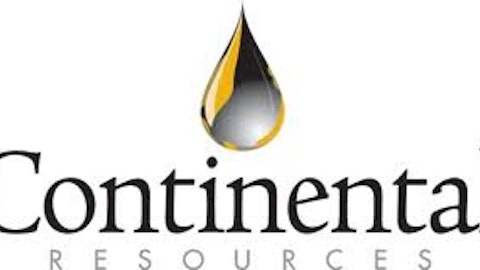Last year was not the year Utica producers were hoping to have. What was once viewed as America’s next great oil play only turned in a trickle of oil production in 2012. In fact, the 87 wells drilled by 11 different companies produced just 1,750 barrels of oil per day last year, or about 635,900 barrels of oil in totality. For perspective, the Bakken produced 674,621 barrels of oil per day in January. Suffice it to say, the Utica has a long way to go.
This is why several of the play’s producers, including Range Resources Corp. (NYSE:RRC) and EQT Corporation (NYSE:EQT) , are coming together on a joint industry project to gain better insight into the play. The project, which is expected to last at least a year, will help the companies gain a better fundamental understanding of what rock properties are the most important for good wells. The hope is that the project will enable producers to better target the play in order to earn a return.

Source: Chesapeake Energy Corporation (NYSE:CHK)
Because of the lackluster returns so far, major oil and gas producers like Chesapeake Energy Corporation (NYSE:CHK) and Devon Energy Corp (NYSE:DVN) have announced plans to reduce operations in the play. Devon Energy Corp (NYSE:DVN), which is completely exiting the play, really had a rough year, as most of the wells it drilled were not economical. One of the issues is the oil accumulations located in the shale were in areas that lacked the pressure necessary to force the oil out of the shale. Chesapeake Energy Corporation (NYSE:CHK), on the other hand, is selling what is no longer core acreage in order to shore up its balance sheet.
Because of this, the play is a lot more gassy than originally thought, and with natural gas prices still low, it is not helping producers that had turned to the Utica for higher margin liquids. The hope is that the joint industry project will help the industry better target the more liquids-rich gas portions of the play, which would provide higher rates of return.
So far, Gulfport Energy Corporation (NASDAQ:GPOR) has had the best success rate in targeting the liquids rich part of the play. The company is spending $499 million of its $570 million capital budget this year on the Utica. Those funds will help drive the company’s production from just over 7,000 barrels of oil equivalent per day last year to more than 21,000 barrels of oil equivalent per day this year. This is mainly due to the fact that Gulfport has been drilling some of the best wells in the play.
Chesapeake Energy Corporation (NYSE:CHK) has also found some of the more successful areas of the play. It expects to see its production jump from 60 mmfce/d, where it ended the first quarter, all the way to 300 mmcfe/d by the end of the year. Chesapeake Energy Corporation (NYSE:CHK) has not only found some of the better spots, but by moving to multi-well pad drilling, it expects to shave about 30% off its well costs, which will help to boost its returns.
Range Resources Corp. (NYSE:RRC) and EQT Corporation (NYSE:EQT) are relative newcomers to the play, as both have focused more extensively on the Marcellus. That focus has enabled them to be among the lowest cost natural-gas producers in the country, which enables both to profit even as natural gas prices stay low. The joint project in the Utica is designed to find the most economical ways to target that play, so that overall returns won’t be harmed.
The takeaway for investors is pretty clear: the potential to earn solid returns from the Utica remains. The trick will be finding the best ways to develop the play. As first movers, Chesapeake Energy Corporation (NYSE:CHK) and Gulfport have already laid claim to some great spots in the play, which is a reminder of the rewards of being a first mover. On the other hand, Devon Energy Corp (NYSE:DVN)’s big miss highlights the risk of being a first mover. That’s why Range Resources Corp. (NYSE:RRC) and EQT Corporation (NYSE:EQT) are banding together with a couple other peers and using science as leverage to find the right techniques to develop the play. That will help both companies deliver returns, but with less risk of coming up dry.
The article Why Science Will Be the Key to Unlocking the Utica’s Potential originally appeared on Fool.com is written by Matt DiLallo.
Fool contributor Matt DiLallo has no position in any stocks mentioned. The Motley Fool recommends Range Resources. The Motley Fool owns shares of Devon Energy and has the following options: long January 2014 $20 calls on Chesapeake Energy, long January 2014 $30 calls on Chesapeake Energy, and short January 2014 $15 puts on Chesapeake Energy.
Copyright © 1995 – 2013 The Motley Fool, LLC. All rights reserved. The Motley Fool has a disclosure policy.




